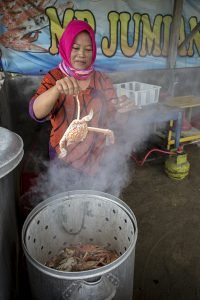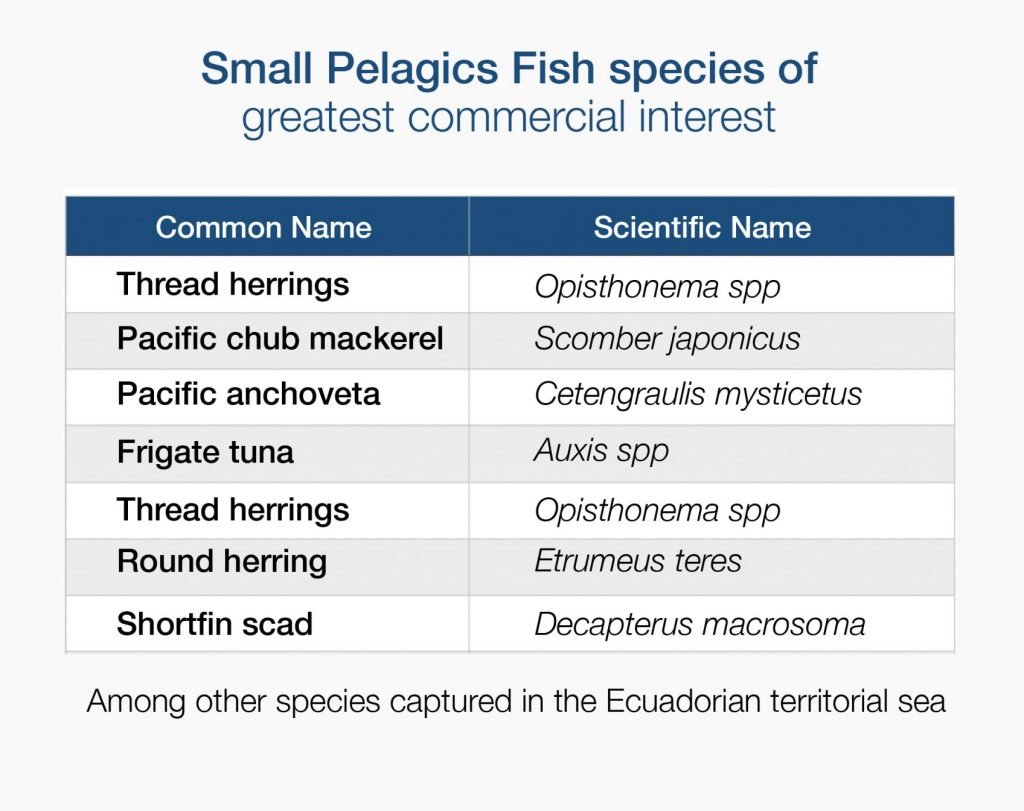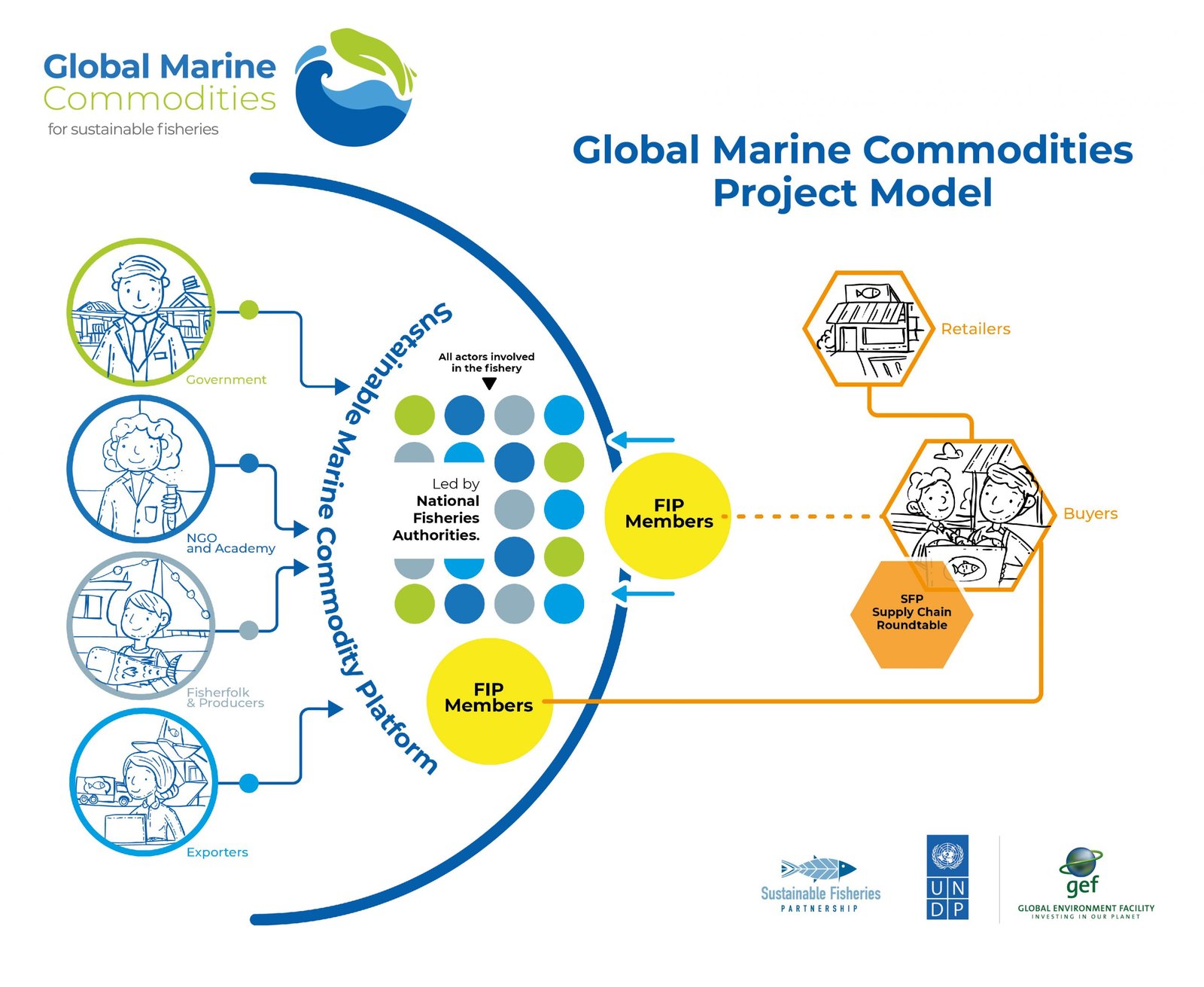Global sustainable certification puts Indonesian fisheries on the map
Global sustainable certification puts Indonesian fisheries on the map by Global Marine Commodities Project on Exposure
Global sustainable certification puts Indonesian fisheries on the map by Global Marine Commodities Project on Exposure

Nining working at the Jumiang Indah processing plan.
This year´s celebration of World Fisheries Day gives us another opportunity to reprise the importance of protecting our fishers and ensuring nutritious, safe, and sustainable seafood on our table. These fishers include Nining and Abdul Harris, a couple based in the East Java town of Pamekasan who are among the 90,000 fishers from across the country who specialize in catching the crab species called rajungan in Bahasa Indonesia. They also include Anderson Maluengseng, a third-generation pole-and-line tuna fisher from Indonesia, and his crew of 35 fishers who are part of an estimated 24,500 Indonesians who fish for yellowfin and skipjack tuna using the traditional pole-and-line technique.
Since 2018, the Ministry of National Development Planning of the Republic of Indonesia (BAPPENAS) and the United Nations Development Programme (UNDP) through the Global Marine Commodities (GMC) Project have collaborated with the Indonesian Blue Swimming Crab Association (APRI) and the Indonesian Pole & Line and Handline Fisheries Association (AP2HI) to accelerate mainstreaming sustainability in the Blue Swimming Crab (BSC) and tuna pole and line fisheries.
As a one of main global producers for fish, Indonesia’s actions and progress in managing its fisheries, to some extent, will always have an impact on world fisheries. For example, in challenging illegal fishing in its waters, Indonesia is contributed to shedding light on an illegal practice that is widely accepted as a key driver of global overfishing, as well as its various links to major human rights violations.
Notably, in the last decades Indonesia also has become one of the major countries that implements fishery improvement projects (FIPs), a multi-stakeholder effort to promote the sustainability of a given fishery (whether or not the fishery intends to pursue ecolabel certification). A FIP identifies the environmental issues that need to be addressed, sets the priority actions to be undertaken and oversees the action plan adopted, which generally covers three aspects: stock health, impact to the environment, and effective management.
During the period of the GMC Project’s work with fisheries industries and the Government of Indonesia, the FIPs are continuing to make a difference in Indonesia and the global fishery landscape. This progress is also noticed by the government.
“The journey of the pole and line tuna fishery towards ecolabel certification is anticipated to generate lessons and best practices as well as motivation for other Indonesian fisheries that also seek to enter global markets for sustainable seafood” said Sri Yanti, Director of Marine Affairs and Fisheries at BAPPENAS, during the development of new five-year National Tuna Management Plan last October 2019.
Another important progress is highlighted by Presidential Regulation No. 18/ 2020 on the National Medium-Term Development Plan (RPJMN) for 2020-2024, where Indonesia will accelerate implementation of Fishery Management Areas (known as Wilayah Pengelolaan Perikanan or WPP). Established by the Fisheries Law No 33/ 2004 which has been revised by Law No 45/ 2009, WPP is identified as a management area for fishing, aquaculture, conservation, research and fisheries development which includes inland waters, archipelago waters, territorial seas, additional zones, and Indonesia’s exclusive economic zone.
Utilising a regional approach, the implementation of WPP as a basis for fisheries development is expected to boost fisheries productivity which in turn optimises sectoral and regional growth. With Indonesia´s relatively diverse marine ecosystem, WPP is viewed as an effective approach to answer the complexity in the fishery and marine sector. Importantly, the WPP-based approach will play a role in providing a platform for integrating and harmonising the roles of at least 26 government agencies that are working on fisheries-related management, including consolidating all other non-public sector stakeholders to collaboratively address the issues through an integrated perspective.
“The WPP based approach utilises “regional led national management” that places regional and local participation as the main input to policy making, while policy makers at the national level play a role in providing guidance and formalizing fisheries management policies. This approach will create synergies, embrace regional characteristics, and reduce conflict”, said Arifin Rudiyanto, Deputy Minister for Maritime Affairs and Natural Resources, Ministry National Development Planning/ BAPPENAS, on a national webinar alongside other Director Generals in the Ministry of Marine Affairs and Fisheries, last April 2020, focusing on the transformation of WPP to improve the performance of the fisheries sector.
 Then came the global COVID-19 pandemic. Despite having affected the lives of millions of fishers in Indonesia, the Ministry of Marine Affairs of Fisheries reported that the fisheries sector was relatively unaffected economically by COVID-19. Unlike other sectors that experienced supply chain disruptions in the second and third quarter of 2020, the fisheries sector was able to maintain its stability throughout the quarters, and in fact showed a higher export performance compared to the previous year.
Then came the global COVID-19 pandemic. Despite having affected the lives of millions of fishers in Indonesia, the Ministry of Marine Affairs of Fisheries reported that the fisheries sector was relatively unaffected economically by COVID-19. Unlike other sectors that experienced supply chain disruptions in the second and third quarter of 2020, the fisheries sector was able to maintain its stability throughout the quarters, and in fact showed a higher export performance compared to the previous year.
This trend gives hope to the sector and will definitely become a foundation to optimise the performance of fisheries as a leverage for other sectors to rebuild, such as logistics, transportation, trade as well as food and consumption.
However, a precautionary approach must be strictly applied. It is widely known that several fish stock in Indonesia’s waters have been either overfished, or maximally sustainably fished, with few being underfished. Additionally, there are looming impacts of climate change which might be more critical given Indonesia’s position on the equator line.
Fortunately, we know that fisheries management works, and Indonesia has the tools to continue the path towards sustainable and productive fisheries. Importantly, Indonesia is also able to make choices to build better fisheries. For instance, in February of 2020, Indonesia launched the Harvest Strategy for BSC for areas around the Java Sea, which contributes nearly 50% of BSC to national production. This harvest strategy— the first of its kind in Indonesia—aims to maintain and/or improve reproductive capacity and ensure the sustainability of the blue swimming crab industry. Next in the process is a harvest strategy for tuna in the archipelagic waters and the updating of eleven fisheries management plans for WPP.
Clearly, Indonesia is the right path in progressing towards better and more sustainable fisheries. But the work is not done yet.
About the Global Marine Commodities Project (GMC)
The GMC Project is an interregional initiative implemented by the Ministries and Bureaus of Fisheries, Production and Planning of Costa Rica, Ecuador, Indonesia and the Philippines, with technical support of the United Nations Development Programme (UNDP), facilitated by the Sustainable Fisheries Partnership (SFP) and funded by the Global Environment Facility (GEF).
For more information on this Project please consult the project website. Alternatively, please contact the Indonesia´s Project Coordinator Jensi Sartin jensi.sartin@undp.org.
The last stock evaluation developed by the Research Public Institute of Aquaculture and Fishing (IPIAP) on the state of small pelagic species stocks in Ecuador, shows significant progress in the state of Frigate tuna, Pacific anchoveta, Pacific chub mackerel, Thread herrings, Shortfin scad and Round herring between 2017 and 2019.
The evaluation concluded that in 2017, 100 percent of the six small pelagic stocks were overexploited and 50 percent were overfished. In 2019, the results of the stock evaluation determined that two of the species, Frigate tuna and Thread herrings, had come out of their state of overexploitation and none of the small pelagic stocks in Ecuador were overfished.
Juan Javier Garcia Bodniza, Director of IPIAP affirmed “the development of the last stock evaluation shows that the joint efforts between the public and private sector is resulting in the recovery of pelagic populations. As the National Investigation authority for the fishery sector, our commitment and work will always be directed towards guiding science-based decision making to contribute towards the sustainability of fishery resources in Ecuador”.
Fishery improvement Project promotes sustainability measures
Beginning in 2018, due to the effort of 22 Ecuadorian companies involved in the small pelagics fish supply chain, with technical support from the United Nations Development Programme (UNDP) Global Sustainable Supply Chains for Marine Commodities (GMC) Project and its partner Sustainable Fisheries Partnership(SFP), the Small Pelagics Fishery Improvement Project (Small Pelagics FIP) was established with the objective of improving the sustainability of these resources through measurable and verifiable improvements in fishery management.
The GMC Project and its partner SFP provided seed funding to initiate the Small Pelagic FIP, and in return, the Ecuadorian private sector FIP implementers committed more than $1.5 million dollars to implement the FIP’s five-year work plan. This FIP aims to achieve sustainable certification from MARINE TRUST, a unique international programme for marine ingredient certification.
Among the actions implemented to date is the adoption of voluntary management measures to reduce fishing effort and improve the stock status and sustainability of the fishery. The fisheries closure season was extended (over two periods), with a total of 61 days in 2017, 77 days in 2018, 83 days in 2019 and 80 days in 2020; and a seven-day closure was established during the full moon each month.
“This FIP represents our desire to ensure a supply of fish for many future generations, and to work in an environment of respect for law and nature. This journey has been complicated and the economic environment has been challenging, with low captures in the last few years and the pandemic. Despite this, milestones have been reached and the state of the fishery has improved,” emphasized Carlos Cacao, President of the Small Pelagic Commission for the National Chamber of Fisheries (CNP).
In parallel, the Government of Ecuador is leading a participatory governance approach called a “Sustainable Marine Commodity Platform”. This intersectoral decision-making platform based on a global methodology promoted by the UNDP, includes government and private sector representatives, fishers, processers, scientists and civil society involvement. They work together in the development of an Action and Management Plan for the Small Pelagics Fishery, in this way allowing for the definition of policies to improve the environmental, social and economic performance of this fishery and serving as an example for other species, such as Mahi Mahi.
“Ecuador is demonstrating that structured processes that empower and promote public-private alliances contribute to strengthening participatory governances that, at the same time, helps improve the sustainability levels of fisheries and their supply chains. These results encourage the continuation of our work for the common objective of achieving the sustainability of fisheries resources”, highlighted Andres Arens, Ecuador´s Vice Minister of Aquaculture and Fisheries.
Small pelagics, key species for the Ecuadorian fishery industry
The small pelagic fishery is the second most important industrial fishery in Ecuador and is of great economic and social importance in the country. The extractive activity, landings, processing (canning and fish flour) and exports generate high levels of foreign exchange, and the fishery provides jobs to more than 25 000 employees.

The resources considered in this fishery perform a key ecological role in marine ecosystems, and as such, the actions and commitment of different sectors not only contribute to achieving the sustainability of these resources but also serve as an example to be replicated in other fisheries and contribute to achieving the Sustainable Development Goals (SDGs) in Ecuador.
About the GMC Project
The Global Sustainable Supply Chains for Marine Commodities Project (GMC) is an interregional initiative implemented by the Ministries and Bureaus of Fisheries and Planning of Costa Rica, Ecuador, Indonesia and the Philippines, with technical support from the United Nations Development Programme (UNDP), facilitated by the Sustainable Fisheries Partnership (SFP) and funded by the Global Environment Facility (GEF).
Blog by:
Karen Hildahl, Monitoring and Evaluation Specialist, GMC/UNDP
Diego Orellana, International Project Coordinator ,GMC/UNDP
Enrique Alonso, Fisheries Coordinator, SFP
“Business as usual”. It was not long ago that we used this expression. However, the COVID-19 global pandemic has required us to rethink its meaning. The crisis has had profound impacts on the seafood sector, and on the livelihoods of industrial and small-scale fishers as a result. The food system has been disrupted all along the supply chain, from demand and supply to production. The pandemic has exposed the vulnerability of communities dependent on fisheries as a result of the informal status of the fishing activity. Women and men who work in unmanaged fisheries often lack access to basic rights and fishing communities that operate in the informal economy risk being left out of relief aid.
The current situation offers an opportunity to reflect on the state of fisheries prior to the COVID-19 crisis and highlights the need for a paradigm shift in the fisheries sector. On the demand side, there are still markets that do not distinguish where their fish come from and buy them without any sustainability requirements. On the supply side, illegal, unreported and unregulated (IUU) fishing continues to raise global challenges, and many fishers are left vulnerable as they operate under informal regimes.
The crisis is shedding light on the urgent need to strengthen management and enforcement as well as formality in the fishing sector. Economic reactivation measures post- COVID-19 should go hand in hand with improved fisheries governance. The GEF-funded UNDP/Global Marine Commodities (GMC) project and its partner Sustainable Fisheries Partnership (SFP), promote a multi-actor approach that can help prevent fisheries from slipping back into the pre- COVID-19 scenario, by avoiding destructive practices and achieving sustainable marine commodities. Actions implemented by the project are focused on:

Global Marine Commodities Project Model
The COVID-19 pandemic has shown us that there is an opportunity to promote sustainable fisheries actions that involve the entire supply chain. The GMC Project works with international supply chains as well as domestic producers and processors. It serves as a test case of a comprehensive co-management model, integrating government-coordinated platforms, market-based tools and private sector led FIPs.
The private sector can steer change by developing and promoting the right set of incentives during the recovery process. Responsible businesses can broaden pre-competitive collaborations in support of global policy requirements that affect most of the fisheries they are involved with or depend on. They can join together to push for improved fisheries management as part of reactivation measures and renew commitments towards sustainable sourcing.
There is a need to further promote collaborations, learn lessons from this process, rethink strategies and promote more innovation in the future to address the issues raised by this crisis and continue to advance sustainable fisheries and human well-being.
A holistic approach for sustainable fisheries and a blue economy by Global Marine Commodities Project on Exposure